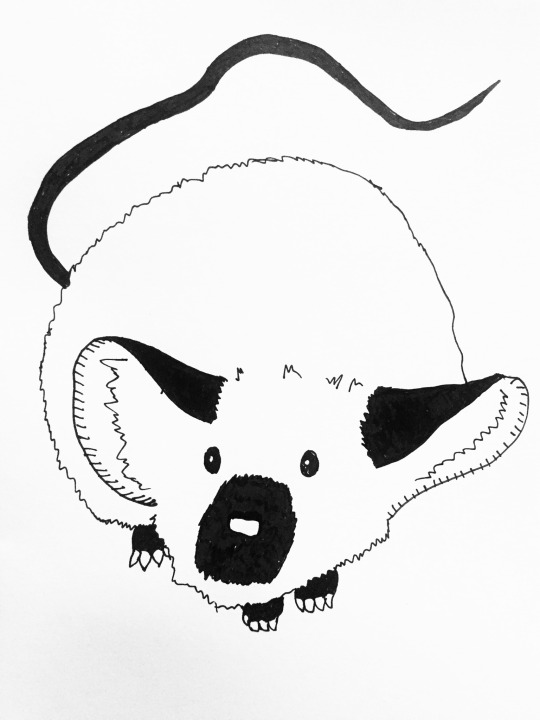#nanking
Text
We all speak about the bad things that Nazis did and even the shit that went down in communist Russia to some extent but ig the hell that was Japanese Imperial Army gets a pass.
#tw ww2#world war two#imperial japanese army#nanking#nanjing#Its the same as talking about war torn middle east because US or the terror that it exports to others but NEVER about the Yehzidi community
40 notes
·
View notes
Photo

Soldats japonais sur un char Panzer I de l'armée chinoise pendant la bataille de Nankin – Nankin – Chine – 9 décembre 1937
#WWII#Guerre Sino-japonaise#Second Sino-Japanese War#Bataille de Nankin#Battle of Nanking#Armée japonaise#Japanese army#Armée impériale japonaise#Imperial japanese army#Char#Tanks#Char léger#Light tank#Panzerkampfwagen I#Panzer I#Nankin#Nanking#Nanjing#Chine#China#09/12/1937#12/1937#1937
33 notes
·
View notes
Photo
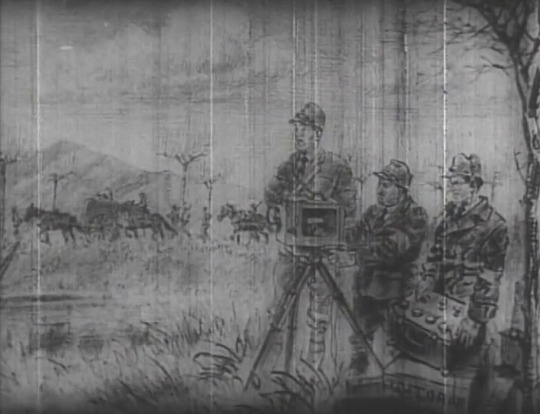
Ken Akimoto
- Nanking 戦線後方記録映画 南京
1938
#nanking#propaganda#propaganda film#ken akimoto#秋元憲#南京#江文也#戦線後方記録映画 南京#Jiang Wen Ye#nanjing#nanjing massacre#1938#sketch#camera#film camera
35 notes
·
View notes
Text
Even by the standards of history's most destructive war, the Rape of Nanking represents one of the worst instances of mass extermination, when the Japanese Imperial Army invaded the Chinese city of Nanking and tortured its inhabitants in the most barbaric ways possible. While it is true that in the twentieth century, Hitler killed about 6 million Jews and Stalin more than 40 million Russians, these deaths were brought about over some few years. In the Rape of Nanking, the killings were concentrated within a few weeks.
The death toll of Nanking - one Chinese city alone - exceeds the number of civilian casualties of some European countries for the entire war.
The worst air attacks of the war [WWII] did not exceed the ravages of Nanking. It far exceeded deaths from the American raids on Tokyo, even exceeding the combined death toll of the two atomic blasts at Hiroshima and Nagasaki.
Yet this massacre remains neglected in most of the historical literature published in the United States, and remains virtually unknown to people outside of Asia. Only in Robert Leckie's book, Delivered from Evil: The Saga of World War II, did I find a single paragraph about the massacre: "Nothing the Nazis under Hitler would do to disgrace their own victories could rival the atrocities of Japanese soldiers under General Iwane Matsui."
That the Nanking massacre my parents told me about was not merely folk myth but accurate oral history hit me in December 1994, when I attended a conference sponsored by the Global Alliance for Preserving the History of World War II in Asia, which commemorated the victims of the Nanking atrocities. In the conference hall the organizers had prepared poster-sized photographs of the Rape of Nanking - some of the most gruesome photographs I had ever seen in my life. Even children and infants were tortured and killed.
Though I had heard so much about the Nanking massacre as a child, nothing prepared me for these pictures - stark black-and-white images of decapitated heads, bellies ripped open, and nude women forced by their rapists into various pornographic poses, their faces contorted into unforgettable expressions of agony and shame.
At the time, no one had written a nonfiction book on the Rape of Nanking in English, and there were only two fiction novels that were in the works. Why had nobody else?
I soon had at least part of the answer as to why the massacre had remained relatively untreated in world history. The Rape of Nanking had not penetrated the world consciousness in the same manner as the Holocaust or Hiroshima because the victims themselves had remained silent.
Furthermore, an atmosphere of intimidation in Japan stifled open and scholarly discussion of the Rape of Nanking, further suppressing knowledge of the event. In Japan, to express one's true opinions about the Sino-Japanese War could be - and continues to be - career-threatening and even life-threatening. (In 1990 a gunman shot Motoshima Hitoshi, mayor of Nagasaki, in the chest for saying that Emperor Hirohito bore some responsibility for World War II.)
What baffled and saddened me during the writing of this book was the persistent Japanese refusal to come to terms with its own past. It is not just that Japan has doled out less than 1 percent of the amount that Germany has paid in reparations to its war victims. It is not just that, unlike most Nazis, who, if not incarcerated for their crimes were at least forced from public life, many Japanese war criminals continued to occupy powerful positions in industry and government after the war. And it is not just the fact that while Germans have made repeated apologies to their Holocaust victims, the Japanese have enshrined their war criminals in Tokyo - an act that one American wartime victim of the Japanese has labeled politically equivalent to "erecting a cathedral for Hitler in the middle of Berlin."
Strongly motivating me throughout this long and difficult labor was the stubborn refusal of many prominent Japanese politicians, academics, and industrial leaders to admit, despite overwhelming evidence, that the Nanking massacre had even happened. In contrast to Germany, where it is illegal for teachers to delete the Holocaust from their history curricula, the Japanese have for decades systematically purged references to the Nanking massacre from their textbooks, removed photographs from museums, tampered with original source material, and excised from popular culture any mention of the massacre.
The ugliest aspects of Japanese military behavior during the Sino-Japanese War have indeed been left out of the education of Japanese schoolchildren. But they have also camouflaged the nation's role in initiating the war within the carefully cultivated myth that the Japanese were the victims, not the instigators, of World War II. The horror visited on the Japanese people during the atomic bombings of Hiroshima and Nagasaki helped this myth replace history.
-Iris Chang, The Rape of Nanking
#iris chang#the rape of nanking#book#book quotes#nanking#china#japan#world war ii#history#chinese history#japanese history#war crimes
19 notes
·
View notes
Text
Do the Japanese have any racial slurs for the Chinese? I'm writing a fiction involving some paranormal imperial japanese soldiers being evil
#nanking#percy jackson#percy jackon and the olympians#percabeth#grover underwood#annabeth chase#slurs#racial slurs#chinese#japanese#japanese culture#chinese culture#anime#manga#one piece#naruto#anime and manga#anime art#hentxi#anime hent#yaoi manga#yaoi bl#yaoi#yaoi manhwa#boys love#noncon tw#fanfiction#writers on tumblr#writblr#fanficblr
3 notes
·
View notes
Text
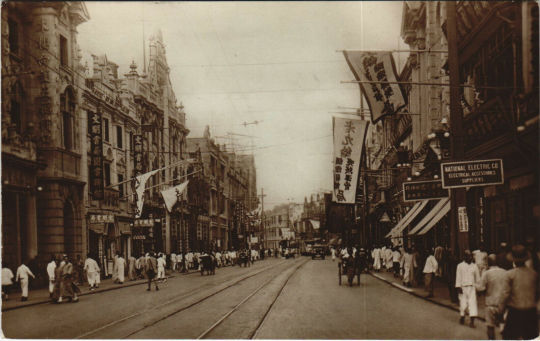
Nanking Road in 1930, Shanghai, China
British vintage postcard
#shanghai#vintage#photography#british#postkarte#carte postale#postal#road#briefkaart#china#nanking#nanking road#postcard#old#photo#ansichtskarte#sepia#1930#postkaart#ephemera#tarjeta#historic
6 notes
·
View notes
Text
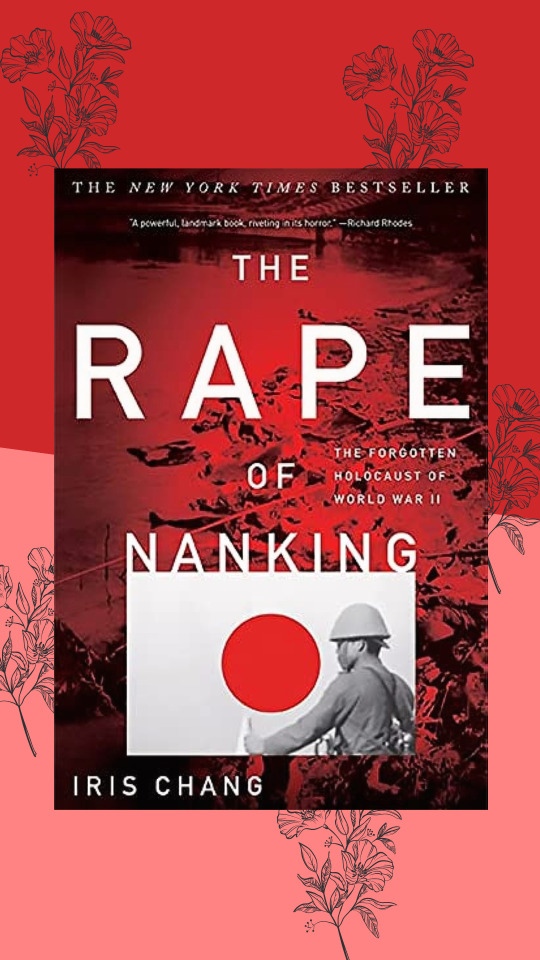
☆The Rape Of Nankings☆
-By Riya
“Germany is today a better place because Jews have not allowed that country to forget what it did during World War II. The American South is a better place for its acknowledgement of the evil of slavery and the one hundred years of Jim Crowism that followed emancipation. Japanese culture will not move forward until it too admits not only to the world but to itself how improper were its actions during World War II.”
The Rape of Nanking is a 1997 book by Iris Chang that details the atrocities committed by Japanese imperial soldiers during the Nanking massacre, a six-week period in 1937 and 1938 when Japanese troops captured and occupied the city of Nanking, China. The book is based on extensive research, including interviews with survivors, and it provides a harrowing account of the systematic rape, murder, and looting that took place.
Chang's meticulous research and vivid descriptions paint a chilling picture of the horrors that unfolded in Nanking. From the gruesome acts of violence to the stories of survivors, the book offers an unflinching look at the human capacity for cruelty and the depths of suffering endured by the victims.
As a reader, the book evokes a range of emotions, from shock and anger to profound sadness. It is a reminder of the importance of acknowledging and confronting the atrocities of the past, no matter how painful. Chang's narrative not only sheds light on the historical events but also serves as a powerful testament to the resilience of the human spirit in the face of unimaginable adversity
The book has had a profound impact on me i have found it to be deeply disturbing and upsetting. The level of violence and depravity described in the book is difficult to fathom, and it is easy to understand why it has been called "one of the most horrifying books ever written.
All the incidents mentioned in it raises questions about the nature of war, the responsibilities of nations to protect human rights, and the long-lasting impact of such traumatic events on individuals and societies. Chang's work prompts reflection on the fragility of peace and the urgent need to prevent such tragedies from repeating in the future.
Overall, "The Rape of Nanking" is a heart-wrenching and eye-opening account that leaves a lasting impression on readers. It challenges us to confront uncomfortable truths, empathize with the victims, and strive for a world where such atrocities are never allowed to happen again.
2 notes
·
View notes
Photo

辛夷 五代 歐陽炯 含鋒新吐嫩紅芽,勢欲書空映早霞。 應是��皇曾擲筆,落來地上長成花。 #南京 #nanjing #nanking #spring #春 #春日 #春天 #chinesegarden #踏青 #flowers #花 #賞花 #孤芳倦客 #sunrise #玉蘭 #玉蘭花 #辛夷 #漢詩 #五代詩 #七言絕句 #歐陽炯 (在 Nanjing, China) https://www.instagram.com/p/Cpj9HKDytos/?igshid=NGJjMDIxMWI=
#南京#nanjing#nanking#spring#春#春日#春天#chinesegarden#踏青#flowers#花#賞花#孤芳倦客#sunrise#玉蘭#玉蘭花#辛夷#漢詩#五代詩#七言絕句#歐陽炯
4 notes
·
View notes
Text
金魚 - Goldfish
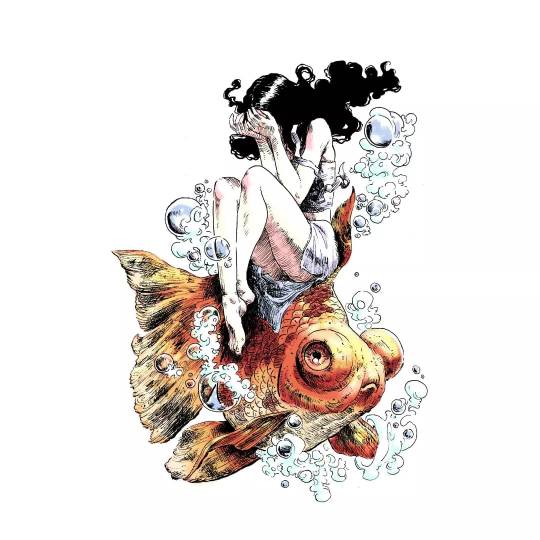
#illustration#ilustração#art#arteconceptual#artwork#artist features#artgallery#art portfolio#nanking#traditional art#japan aesthetic#japanese art#manga art#manga aesthetic#traditional illustration#pen and ink#inking#sketching#sketchbook#beauty#goldfish
9 notes
·
View notes
Text
Just relistened to one of the MK Ultra episodes of @ChilluminatiPod while doing the laundry and thought about what an uplifting movie night these would deliver. 😵
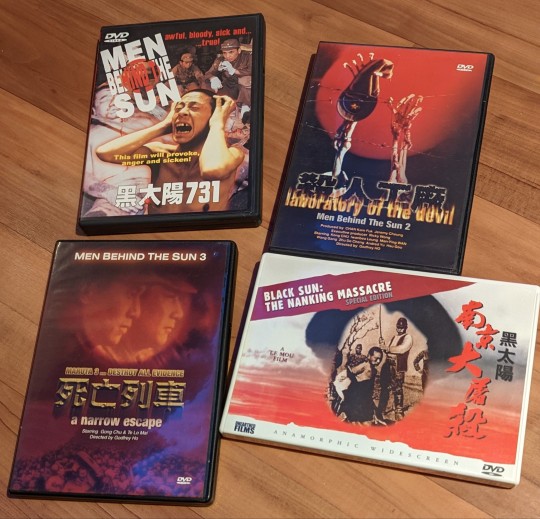
5 notes
·
View notes
Text
Nanjing
3 ans après mon semestre annulé pour cause de pandémie, me voici enfin à Nanjing ! Ancienne capitale de Chine, la ville principale du Jiangsu donne l'impression de faire un bond de quelques siècles en arrière.

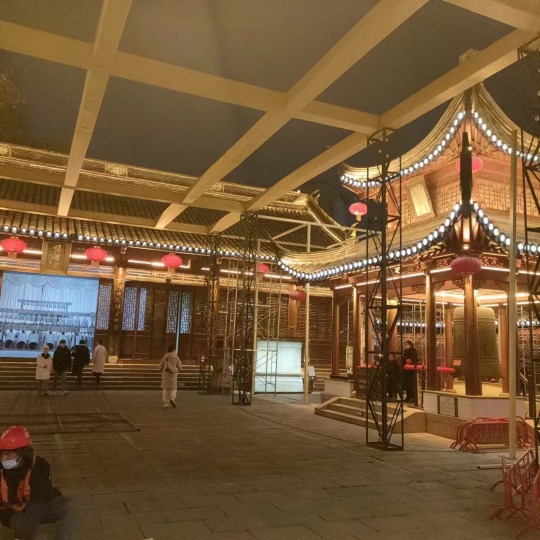




3 notes
·
View notes
Text
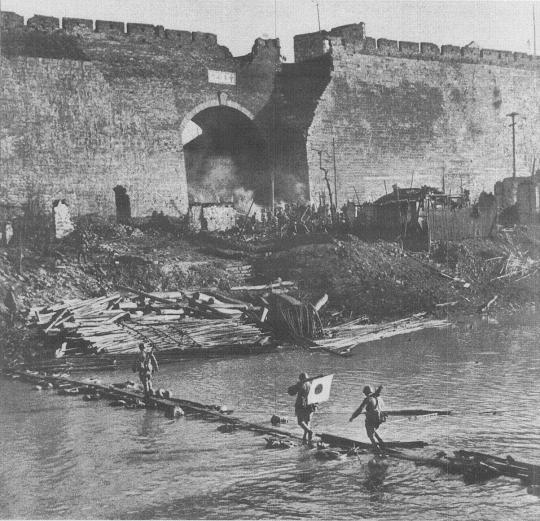
Des soldats japonais traversent les douves de Nankin pour entrer dans la ville par la porte Zhonghua – Bataille de Nankin – Guerre sino-japonaise – 13 décembre 1937
#WWII#guerre sino-japonaise#sino-japanese war#seconde guerre sino-japonaise#second sino-japanese war#bataille de nankin#battle of nanking#battle of nanjing#porte zhonghua#zhonghua gate#nankin#nanking#nanjing#chine#china#13/12/1937#12/1937#1937
3 notes
·
View notes
Text
Nanking, China: An exercise in Human Depravity?
Nanking, China: An exercise in Human Depravity?
The atrocities that unfolded in Nanking China, by the Japanese in 1937, are completely unfathomable to most of the malnourished and enslaved minds of the populace in the West.People alive during that age may not share our reaction to Nanking, their veneer was a little thicker and they understood the nature of might makes right, a cruel reality of Natural Law. Natural LawThe entirety of Mankind’s…
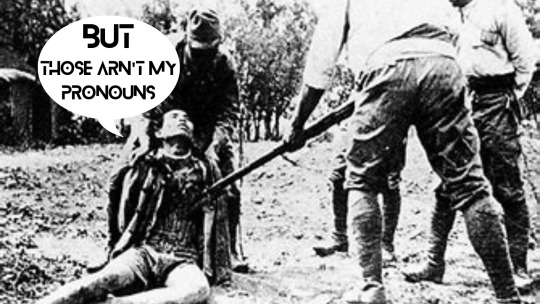
View On WordPress
1 note
·
View note
Text
I have been engaged in collecting testimonies for more than 30 years of the Nanking Massacre. I have written books and held exhibitions. I even started making films. I walked over every street in Nanking and found Chang Shouying, an 87-year-old woman, who survived the massacre. She said she was raped by Japanese soldiers as many as three times. Her three-month-old baby girl was killed and burned. She embraced a strong hatred towards the Japanese. Girls as young as eight were sexually assaulted by soldiers, and whole families ripped apart, made to do unspeakably awful things to their own family members. Decapitated corpses littered the city, and the thousands of bodies dumped into the Yangtze River made the water run red.
-Tamaki Matsuoka
#tamaki matsuoka#quote#nanking#nanking massacre#nanjing#china#japan#genocide#war crimes#military#army#japanese#chinese#30s
3 notes
·
View notes
